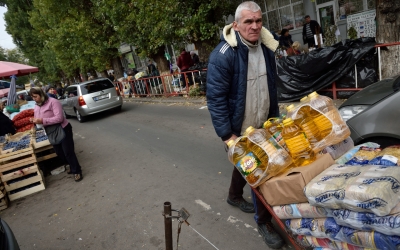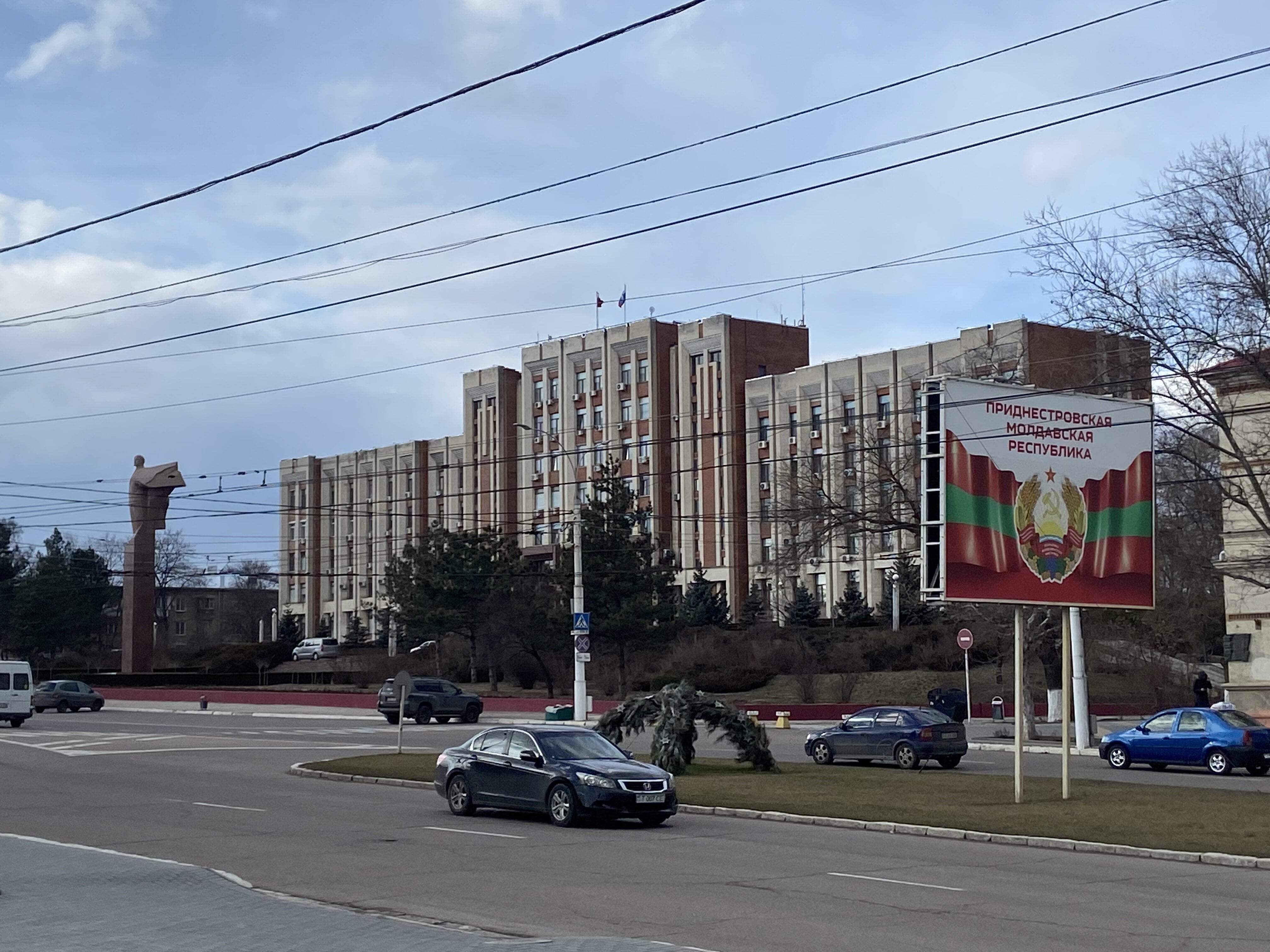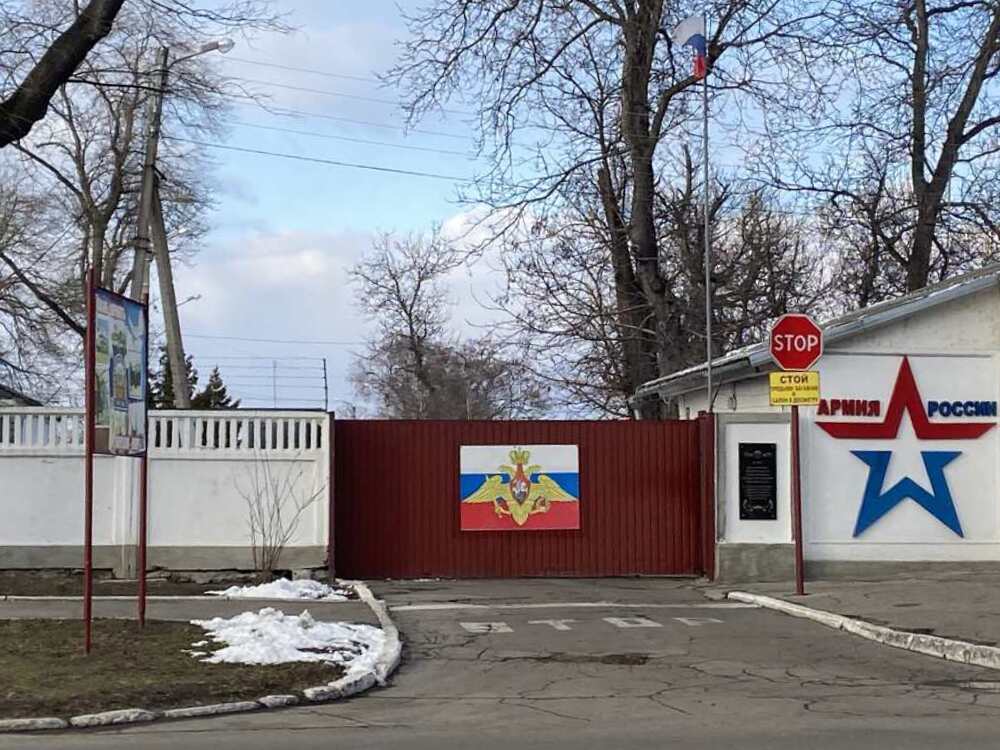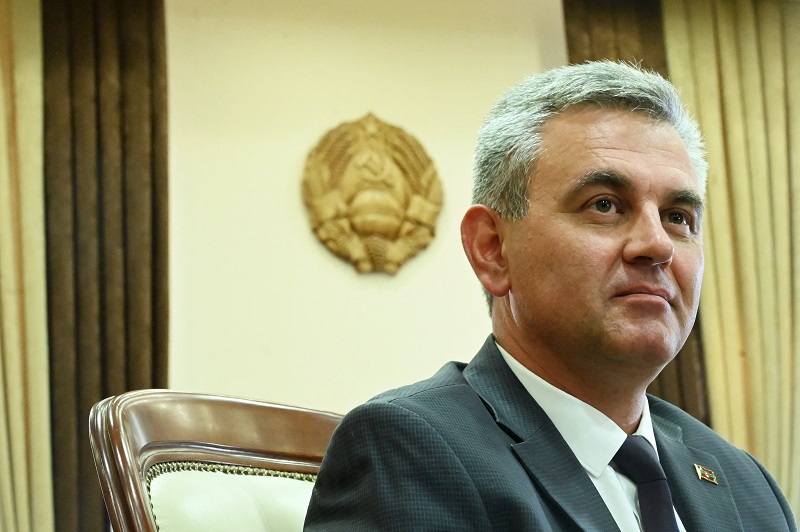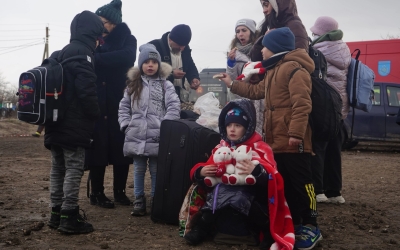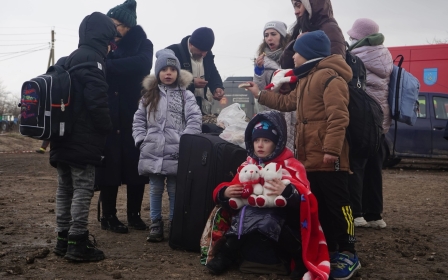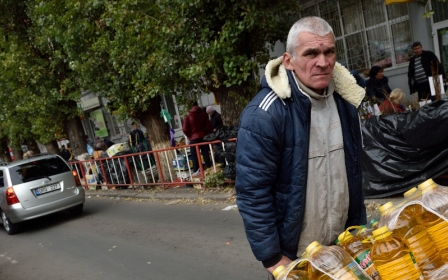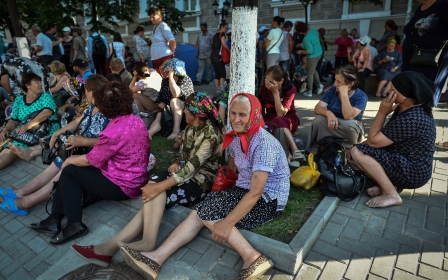Transnistria: The breakaway region torn between Moldova, Russia and the EU
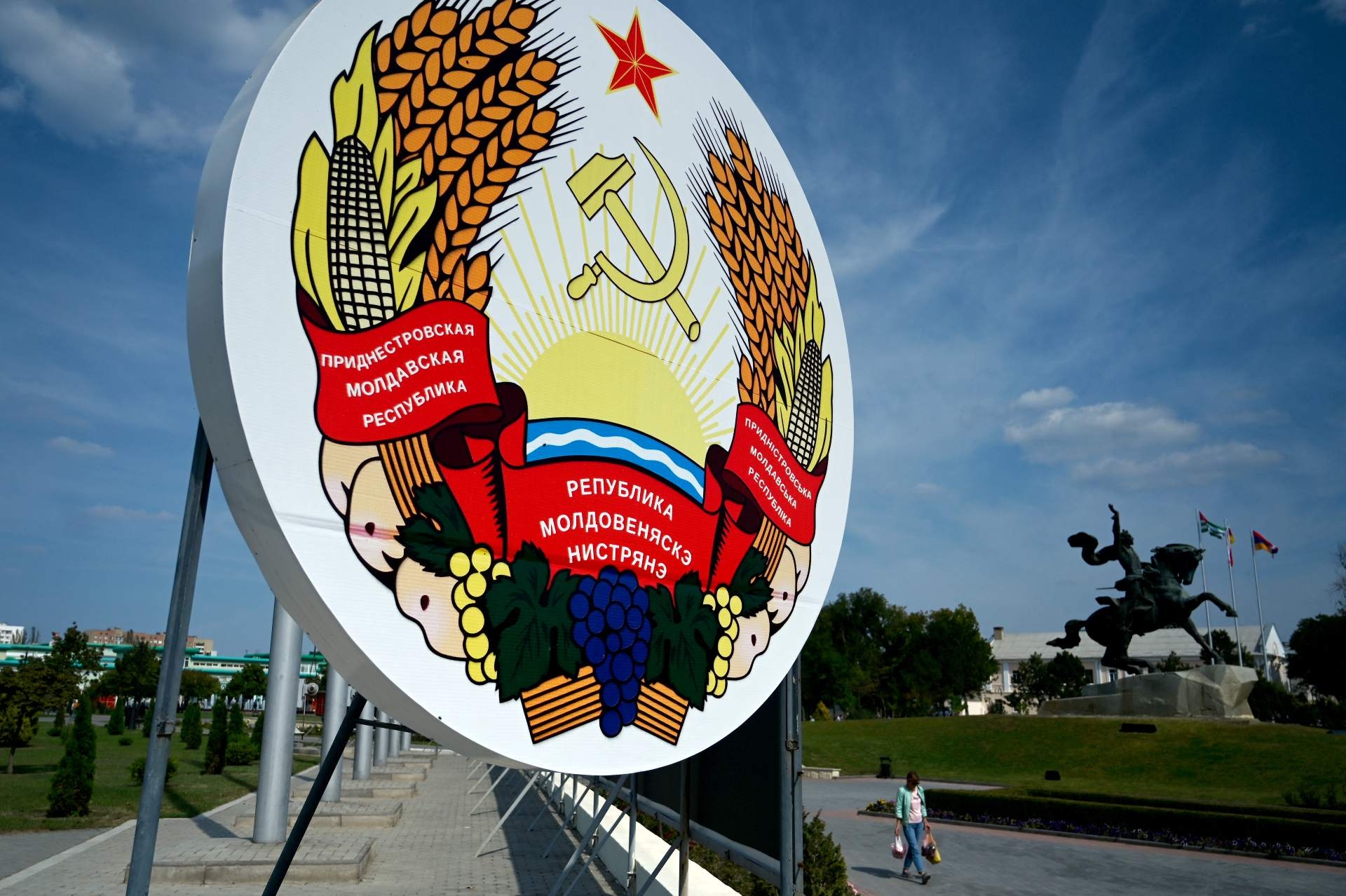
Dumitru Iancev walks the streets of Tiraspol, the capital of the Transnistrian region of Moldova, with caution. He always looks behind his back and is careful not to stay in one place for too long.
The 55-year-old former judge does not identify as Russian, as most people in Transnistria do, but rather as a Moldovan with Bulgarian roots.
“Russia is in charge here,” said Iancev. “You need to be careful.”
Though Transnistria is internationally recognised as part of Moldova, Russian nationalists backed by Russian forces based in the region sought to break away from the former Soviet republic in 1992, fighting a brief war against the authorities in Chisinau in which about 1,000 people died.
The Russian army has remained in the enclave, a slither of land between the Dniester River and the Ukrainian border, ever since. Transnistrian politicians, including the current president, Vadim Krasnoselsky, have in the past called on Moscow to annex the territory.
New MEE newsletter: Jerusalem Dispatch
Sign up to get the latest insights and analysis on Israel-Palestine, alongside Turkey Unpacked and other MEE newsletters
The streets of Tiraspol, Transnistria's self-proclaimed capital, are adorned with Soviet-era buildings, memorials, and iconography and busy with people going about their daily lives.
But war has returned to people's minds again following Russia's attack on Ukraine.
Odesa, Ukraine's main Black Sea port, is just 100 kilometres away.
Born in Moldova, Iancev has lived in the small Transnistrian city of Bender for the past 26 years. He was forced to stop working as a judge in 2003 because, he said, the authorities did not like his rulings and because he is not Russian.
Since then, he has mostly worked as a farmer, as well as advocating for social justice and democracy within the limited freedoms that the authorities allow. He says Transnistria is part of Moldova and supports closer ties with the European Union.
After the Russian invasion of Ukraine last month, Iancev staged a one-man protest on a street corner opposite the Transnistrian parliament, holding up a placard that read “Slava Ukraine!” [Glory to Ukraine!] But his courage was soon stifled after he saw surveillance cameras watching him from a nearby electricity pole.
The same week, there was also a pro-Russian protest in Tiraspol’s main square, which the authorities in the region claim was an attempt to divide the population of a region where the third-largest nationality is Ukrainian.
‘Orders from Moscow’
Transnistria is a place filled with paradoxes, where some support Russia’s invasion of Ukraine, but where Ukrainian refugees are hosted as well.
“[Transnistrians] are waiting for the Russian tanks, they will welcome them with flowers,” Iancev told MEE. “They’re waiting for orders from Moscow.”
Transnistrian authorities have held off from making statements of support for Moscow's invasion, perhaps wary of endangering their economic ties with the EU and Ukraine.
Tiraspol has openly welcomed refugees from the war, with about 17,000 Ukrainians received in the region, according to local media.
Yet Russia’s presence is hard to miss. About 1,300 Russian soldiers – which Moscow describes as peacekeepers – have been based in Transnistria since the end of the war in 1992, manning checkpoints in the territory and at its frontiers.
Official buildings and military bases are adorned with the green-and-red Transnistrian flag next to the Russian flag. A statue of Vladimir Lenin still stands in front of the parliament building, near where Iancev held his protest.
For many among the region’s population (officially 470,000, though analysts estimate the real figure is less than 400,000), Russia’s presence in the region is welcome and necessary.
“The Russians are protecting us. If it wasn’t for them, [Moldova] would’ve crushed us already, but Russia is a shield for us,” Alexandr, a 65-year-old in Tiraspol who did not share his surname, told MEE.
Irina Tabaranu, a Moldovan journalist covering the region, told MEE that “they’re extremely tied into the idea that Russia stopped the Dniester war.
“They consider Russia as a guarantor of their security and there’s even a law that says you can get fined or imprisoned for challenging that.”
'There is no reason for Moldova to become the target of hostile military activities'
- Nicu Popescu, Moldovan foreign minister
Russia’s attack on Ukraine has revived dormant questions about Transnistria’s status.
On 4 March, Tiraspol asked the government in Chisinau to recognise its independence, a call left unanswered. About 10 days later, the Council of Europe recognised for the first time that Transnistria is a Russian-occupied Moldovan territory.
Moldova has always insisted that Russia must withdraw its troops from Transnistria, Moldovan Foreign Minister Nicu Popescu told a press conference attended by MEE on 10 March.
He said Russian troops were there without the host country’s consent and without any legal basis. He said the region held about 20,000 tons of weapons, of which 11,000 were expired.
But there are new strategic and military factors at play that could affect the local balance of power.
Should the Ukrainian cities of Mykolaiv and Odesa fall, a Russian-controlled corridor from the Crimea peninsula, annexed by Moscow in 2014, could be formed all the way to Transnistria.
That prospect has been recognised in Moldova. Popescu told journalists: “There is no reason for Moldova to become the target of hostile military activities.” But, he added, the government had a “responsibility to factor in all the possible threats”.
Dionis Cenusa, an analyst at the Eastern Europe Studies Centre in Lithuania, told MEE that the economic and political elite in Transnistria had not so far been openly supportive of Russia’s war.
But, he said, that situation could change if Russian forces made advances in southern Ukraine.
The risk of such an outcome appears to have been recognised across the border. On 4 March, Ukrainian forces bombed a railway bridge connecting the Odesa region to Transnistria.
Such actions and the looming proximity of the conflict have worried people like 50-year-old Olga - not her real name - whose mother is Ukrainian and her father Moldovan.
“It’s close, we have many relatives there,” she told MEE. “People here want to live in peace and calm.”
'We are all one'
Natalia, a professor of engineering at Tiraspol University who also did not want to use her real name, also comes from a mixed family. With a Ukrainian mother and a Russian father, she admits she does not want to pick sides.
“Moldovans are ours, Russians are ours and Ukrainians are ours. We are all one whole. Based on this, how can we support anyone?” she asked.
When asked if she felt free, Natalia said: “The freedom I have is enough, maybe for others it isn’t."
But there are also those, such as Alexandr, who support the invasion. He believes a Russian victory over Ukraine would be good for Transnistrians. He dreams of travelling freely to Russia without having to fly from Chisinau.
“You won’t lose if you support Russia, you won’t!” Alexandr told MEE. “The war will last a month maximum because we Russians have weapons that hit where they’re supposed to [military targets], not civilians.”
Russia has been widely accused of targeting civilians, with the United Nations Human Rights Council warning that indiscriminate attacks could be a war crime. Russia has denied targeting civilians.
Meanwhile, many young Transnistrians don’t feel they have a future in the region.
“We young people study and work, we don’t care about the war,” said Denis. When asked whether he had any opportunities in the region, he shook his head.
“Young people usually leave this place,” he said.
Ghenadie Ciorba, an activist who was imprisoned last year on charges of insulting Krasnoselsky, the Transnistrian president, told MEE that the region is multinational and opinions about the war have become very divided.
“There are people who are brainwashed by Russian propaganda who support what Russia is doing. There are those who have relatives, friends in Ukraine and really know what is happening and are against it,” said Ciorba.
“So the authorities have taken a kind of neutral position so as not to provoke people against each other.”
'Propaganda machine'
After the 1992 war, the local authorities in Transnistria portrayed Moldovans as potential aggressors, cracking down on Romanian – the official language of Moldova - media and cultural expression.
There are few Romanian language schools in the region, prompting Iancev, a Romanian speaker, to send his seven-year-old son to a Russian school an hour closer to his home than the nearest Romanian one.
“Today my son went to school for the first time after spring break and in art class he had to craft a pistol,” Iancev told MEE.
The indoctrination of people in the region starts early, and is reinforced by an information space dominated by Russian-language media.
“You can’t go there with a Romanian language newspaper, all the newspapers come from Moscow,” said Alina Radu, co-owner of Ziarul de Garda, a Romanian-language newspaper based in Chisinau.
On Telegram groups active in the region, messages and information supporting the Russian army are widely shared and propagated, and Russians are depicted as “brothers”.
Local news channels, one run by the authorities and the other by the Sheriff Holding conglomerate that dominates the local economy, pump out pro-Russian content.
“Ask anyone you want, young or old, they believe the Russian television, their propaganda machine,” said Iancev.
Switching between Ukrainian media and Russian-language media, Denis admits feeling left confused.
“No one knows what is truly happening, so I can’t make a judgement,” he told MEE.
Pensioners feel pinch
The shockwaves of the Russian invasion of Ukraine are also being felt by elderly Transnistrians, 20 percent of whom have been receiving pensions from Russia.
Such pensions were once considered enviable, but the collapse in the value of the rouble prompted by Western economic sanctions is taking its toll. Tiraspol even announced it will give financial help to the Russian elderly whose pensions devaluated over the past weeks.
Prices in the region are set against the US dollar and supermarkets price goods in both US dollars and Transnistrian roubles.
'Moldovans are ours, Russians are ours and Ukrainians are ours. We are all one whole. Based on this, how can we support anyone?'
- Natalia, professor of engineering
“People were bragging about having Russian pensions and now they can’t buy anything with it,” said Iancev.
Sending money from Russia to Transnistria and back will also prove difficult as the US and EU have sanctioned Russia out of Swift, the international banking system.
“More and more people are trying to exchange Transnistrian roubles into dollars, and this is causing the exchange rate to rise,” said Ciorba, the activist.
Transnistria’s economy is also feeling the pinch of war. The region has long been a haven for smugglers and purveyors of contraband, but the closure of the porous Ukrainian border has been bad for business.
Official imports and exports are also likely to be affected by the conflict.
In 2021, exports from the region to Ukraine almost doubled, increasing from $65 million to almost $135 million. An estimated 14 percent of the region's exports used to go to Ukraine.
“Prices have risen sharply, because the main supplier of products used to be Ukraine, today that is no longer the case,” said Ciorba.
Tiraspol announced earlier this year its highest ever trade turnover with Russia of more than $820 million. It also depends on Russia for free gas.
Meanwhile, Transnistrian trade links with the EU are deepening. Annual exports to the EU have increased from $185.8m to $327.7m, and the EU is considered the prime destination for export goods.
More than 42 percent of goods imported to the region come from EU member states.
The central pillar of Transnistria’s economy is Sheriff Holding, a group of companies owned by Victor Gusan with interests including the import and retail of food, auto vehicles, fuel, medicine, the production and export of spirits, hotels, communications, banking, insurance, media, and even a successful football club.
'Our escape, whether we want it or not, is joining the EU, either through Romania or as an independent state, it doesn’t matter, we need to escape'
- Dumitru Iancev
Gusan holds Moldovan, Ukrainian, and Russian passports, allowing him to run a complex web of companies from Tiraspol to Chisinau and Odesa.
Like Transnistria’s political leaders, Gusan has so far been silent about the war, though his football club, Sheriff Tiraspol, which earlier this season beat Real Madrid in the Champions League, did stage a stop the war protest during a recent match.
Many of Tiraspol and Sheriff’s foreign currency accounts are held in Russia and already affected by Western sanctions. With deep economic ties in Ukraine, Moldova, and the EU, a Russian annexation of Transnistria would likely be bad news for Gusan’s business empire.
Tabaranu said the war in Ukraine could push Transnistria back towards Moldova, despite many in the region’s ideological affiliation with Russia, out of economic necessity.
“Transnistria will be dependent on Moldova now they can’t do business with the Ukrainians, with which they shared an unsupervised border. Now everything goes through Moldova and there will be a forced integration with the host country.”
Iancev also sees the current crisis as a possible opportunity for Transnistria to turn back towards Moldova, and the EU beyond.
“Our escape, whether we want it or not, is joining the EU, either through Romania or as an independent state, it doesn’t matter, we need to escape,” he said.
“If we don’t join the EU, in time, the Russians will destroy us. Don’t you see what’s here in Transnistria?”
Daniela Calmis contributed to this report.
Middle East Eye delivers independent and unrivalled coverage and analysis of the Middle East, North Africa and beyond. To learn more about republishing this content and the associated fees, please fill out this form. More about MEE can be found here.


